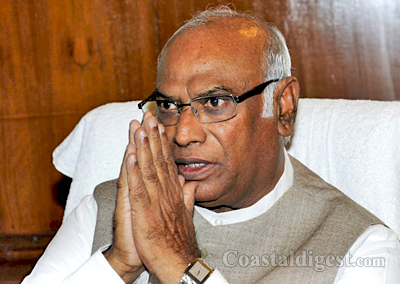 New Delhi, Jun 14: Congress may take legal recourse if its Lok Sabha leader Maliikarjun Kharge is not made the Leader of the Opposition. While there have been reports on why Congress cannot stake a claim to the post, party spokesman Shakeel Ahmad maintained, "the law guarantees it," to the party and the Speaker did not have discretion on who can be Leader of the Opposition.
New Delhi, Jun 14: Congress may take legal recourse if its Lok Sabha leader Maliikarjun Kharge is not made the Leader of the Opposition. While there have been reports on why Congress cannot stake a claim to the post, party spokesman Shakeel Ahmad maintained, "the law guarantees it," to the party and the Speaker did not have discretion on who can be Leader of the Opposition.
The party also denied reports that its president Sonia Gandhi had written to Speaker Sumitra Mahajan to stake claim to the post.
Denying that Gandhi had written a letter, Ahmad said, "Why should Congress president write, staking a claim to the post of Leader of Opposition in the Lok Sabha when the law guarantees it to Congress, which is the largest opposition party in the House?"
The Salary and Allowances of Leaders of Opposition in Parliament Act, 1977, amended in 2002, defines the Leader of the Opposition as, "the Leader in that House of the party in Opposition to the government having the greatest numerical strength and recognised as such by the Chairman of the Council of States or the Speaker of the House of the People, as the case may be."
The law further states that the Speaker of the Lok Sabha or Chairman of Rajya Sabha decides on the post only when there are two or more parties in opposition with the same numerical strength.





Comments
Add new comment